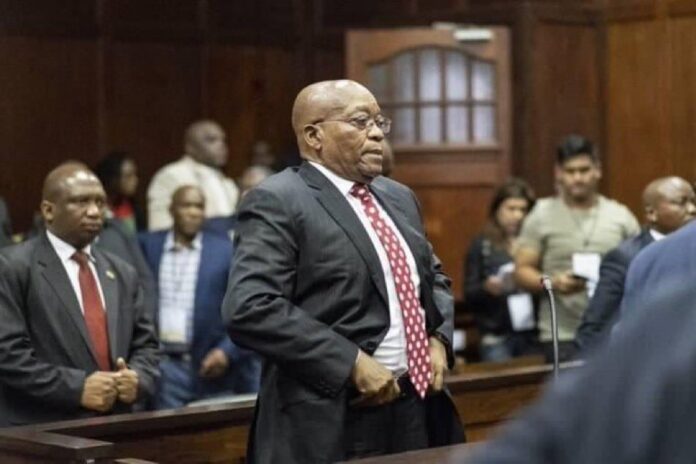Zuma and MK Party Suffer Another Legal Blow as ConCourt Dismisses Challenge to Ramaphosa's Decisions
Former President Jacob Zuma and his MK Party have suffered another legal setback after the Constitutional Court dismissed their case challenging President Cyril Ramaphosa’s decisions related to the South African Police Service (SAPS) and the establishment of the Madlanga Commission.
Constitutional Court Justice Rammaka Mathopo delivered the full judgement and reasons behind the court's initial order on July 31, which had already dismissed Zuma and the MK Party’s case. The case challenged Ramaphosa’s decision to place Police Minister Senzo Mchunu on leave of absence, as well as the appointment of Prof Firoz Cachalia as acting police minister. They also contested the establishment of the Judicial Commission of Inquiry into criminality, political interference, and corruption in the criminal justice system, chaired by retired Constitutional Court Justice Mbuyiseli Madlanga. The commission commenced its proceedings on September 17.
Justice Mathopo stated that the application lacked sufficient evidence to warrant the Constitutional Court's exclusive jurisdiction. He further added that the applicants had failed to make a case for direct access to the apex court. The July unanimous order, initially handed down by Mathopo, had already indicated that the application did not engage the court’s exclusive jurisdiction, with full reasons to follow at a later stage.
This judgement effectively cleared the way for Ramaphosa to appoint Cachalia and for the Madlanga commission to proceed with its work, which is currently underway.
On Friday, Mathopo reiterated the judgement and the reasons behind the July order, emphasising that Zuma and the MK Party’s application could not succeed because they had failed to establish a case for direct access to the Constitutional Court.
According to Mathopo, “The broad allegations [of the applicants] failed to comply with constitutional obligations and are devoid of material evidence for exclusive jurisdiction… The applicants’ complaint is that the president [Ramaphosa] exercised his powers irrationally, and not that he failed to fulfil his constitutional obligations. Such complaints and concerns fall within the jurisdiction of the High Court.”
Mathopo further elaborated on the weakness of the case, stating, “Section 83b is therefore insufficient to ground this court to exclusive jurisdiction. This court finds that Section 83b is coupled by a specific constitutional obligation. No such urgency of a specific constitutional obligation has been identified…”
He continued, “The applicant’s complaint is about the manner in which the president dealt with the matter [corruption allegations in the criminal justice system]. None of the impugned decisions constitute a failure to fulfil constitutional obligations.”
The Justice emphasised that the Constitutional Court was not the appropriate venue for the case, stating, “There is no urgency that necessitates this court hearing this matter and sitting as a court if first and last instance…The applicants have not adequately explained why they did not pursue the available avenue [High Court]…”
In conclusion, Mathopo stated, “In the result, the application cannot succeed. This is not a matter that falls within exclusive jurisdiction. Nor one where interests favour direct access…”
The court also ruled that each party involved in the case should bear their own legal costs.
This legal defeat follows another significant blow for Zuma and the MK Party. On September 18, the second day of the Madlanga commission of inquiry, the Pretoria High Court struck off the roll an urgent application by Zuma and the MK Party seeking to overturn Ramaphosa’s decisions to place Mchunu on leave of absence, appoint Cachalia as acting police minister, and establish the commission.
The Madlanga commission was established by Ramaphosa on July 13, following an explosive media briefing on July 6 by KwaZulu-Natal police commissioner Lt-Gen Nhlanhla Mkhwanazi. During the briefing, Mkhwanazi alleged that politicians in parliament, police officers, metro police officers, correctional service officials, prosecutors, and members of the judiciary in Gauteng were part of a criminal syndicate controlled by drug cartels and business people in the province. The commission is now tasked with investigating these serious allegations.

Follow Us on Twitter











